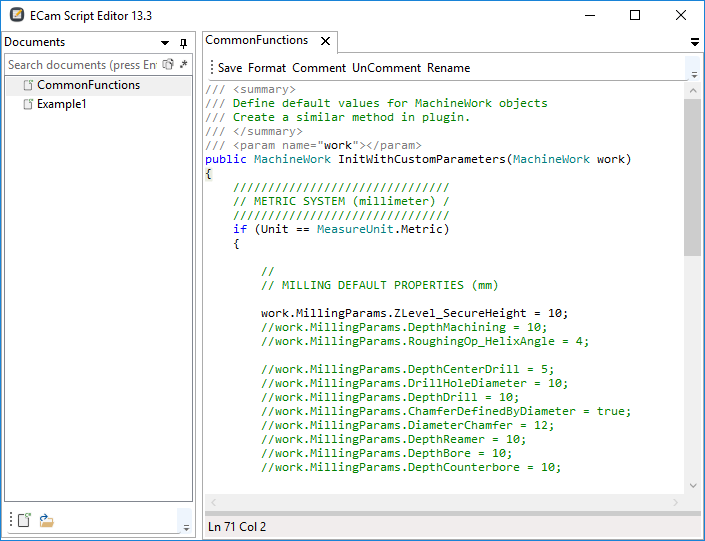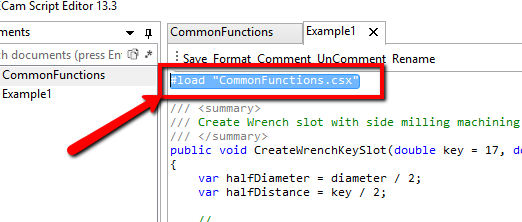Script Editing - Tutorial 4 - Default Values
To set custom default values for newly generated machine works or setup object , is possible create a dedicated function.
It's a good idea write this function in a separated script file , so we can share it with others script file.
- Create a new file , "CommonFunctions" , you can define an other filename if you prefer.
- Inside this file you can write all the common function you are going to use in other files.
- Insert the code below into "CommonFunctions" file :
/// <summary>
/// Define default values for MachineWork objects
/// </summary>
/// <param name="work"></param>
public MachineWork InitWithCustomParameters(MachineWork work)
{
///////////////////////////////
// METRIC SYSTEM (millimeter) /
///////////////////////////////
if (Unit == MeasureUnit.Metric)
{
//
// MILLING DEFAULT PROPERTIES (mm)
work.MillingParams.ZLevel_SecureHeight = 10;
//work.MillingParams.DepthMachining = 10;
//work.MillingParams.RoughingOp_HelixAngle = 4;
//work.MillingParams.DepthCenterDrill = 5;
//work.MillingParams.DrillHoleDiameter = 10;
//work.MillingParams.DepthDrill = 10;
//work.MillingParams.ChamferDefinedByDiameter = true;
//work.MillingParams.DiameterChamfer = 12;
//work.MillingParams.DepthReamer = 10;
//work.MillingParams.DepthBore = 10;
//work.MillingParams.DepthCounterbore = 10;
//
// TURNING DEFAULT PROPERTIES (mm)
//work.TurningParams.AllowanceMaterialX = .3;
//work.TurningParams.AllowanceMaterialZ = .1;
}
/////////////////////////////
// IMPERIAL SYSTEM ( inch )//
/////////////////////////////
else if (Unit == MeasureUnit.Imperial)
{
//
// MILLING DEFAULT PROPERTIES (inch)
//work.MillingParams.ZLevel_SecureHeight = 0.2;
//work.MillingParams.DepthMachining = 0.4;
//work.MillingParams.RoughingOp_HelixAngle = 4;
//work.MillingParams.DepthCenterDrill = 0.2;
//work.MillingParams.DrillHoleDiameter = 0.4;
//work.MillingParams.DepthDrill = 0.4;
//work.MillingParams.ChamferDefinedByDiameter = true;
//work.MillingParams.DiameterChamfer = .45;
//work.MillingParams.DepthReamer = 0.4;
//work.MillingParams.DepthBore = 0.4;
//work.MillingParams.DepthCounterbore = 0.4;
//
// TURNING DEFAULT PROPERTIES (inch)
//work.TurningParams.AllowanceMaterialX = .012;
//work.TurningParams.AllowanceMaterialZ = .004;
}
return work;
}
- It's manage both the metric default values and inch default values.
- UnComment this line and change the default value, if you want.
work.MillingParams.ZLevel_SecureHeight = 10;
You can define also other properties .
This is the script editor window, you can see the CommonFunctions file in left column.
Call functions from other file
Now i want call the function "InitWithCustomParameters" in other script file.
To do so :
- I open the other script file , "Example1" in this case.
- Add this line on top of script file
#load "CommonFunctions.csx"
Note :
If i load "CommonFunctions.csx" in "Example1.csx" , i can't load "Example1.csx" in "CommonFunctions.csx" , otherwise it will lead to a circular reference problem.
Now i edit the wrench slot script, visible in tutorial 3, with this :
....
var millingWork = AddMachineWork(WorkType.Mill_SideMilling);
/// ADD THIS LINE TO SET CUSTOM DEFAULT PARAMETERS ////
millingWork = InitWithCustomParameters(millingWork);
//////////////////////////////////////////////////////
millingWork.MillingParams.MaterialToRemove = halfDiameter - halfDistance;
....
Now if you run again the script , you can see the Secure Z level is edited with your new custom default value.

